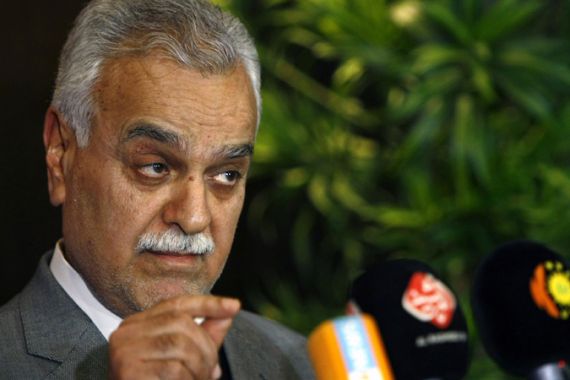Iraqi VP: Baghdad trial ‘not realistic’
Tariq al-Hashimi says he will only stand trial in Kurdish region as prime minister calls for his return to Baghdad.

Tariq al-Hashimi, the fugitive Iraqi vice president who is accused of ordering the deaths of political opponents, has told Al Jazeera he will not return to Baghdad to face trial but is willing to go before a court in northern Iraq’s semi-autonomous Kurdish region.
Hashimi, the country’s most senior Sunni official who says the allegations are part of a political plot against him, was speaking after Nouri al-Maliki, the Iraq’s Shia prime minister, called on Kurdish authorities to hand him over.
“There is no transparency and the system is affected by corruption,” Hashimi told Al Jazeera from Erbil, the Kurdish capital where he fled on Sunday a day after officials in Baghdad issued a warrant for his arrest.
“Iraq’s justice system is in crisis, it has lost its credibility. It’s a tool in the hands of some politicians. Therefore it is not realistic for me to stand trial in front of the system.
“I reiterate what I said before; I am more than happy to face charges in Kurdistan where I can be treated justly.”
The accusations against Hashimi date back to the height of the war in 2006 and 2007, when neighbours turned on neighbours and whole sections of Baghdad were divided along sectarian lines.
The case has raised concerns that the country could again slide into sectarian violence following the withdrawal of US troops.
‘Criminal case’
Hashimi has rejected the charges and earlier called for Arab League representatives to monitor the investigation and any questioning.
However, Maliki rejected Hashimi’s call on Wednesday, saying: “This is a criminal case, and there is no need for the Arab League and the world to have a role in this”.
“We call for the government of the Kurdistan region to take its responsibility and hand over Hashimi to the justice system … We do not accept any interference in Iraqi justice,” he said at a news conference in Baghdad.
Kurdish leaders have been trying to work out a solution while sheltering Hashimi from arrest.
“Kurdish officials in the region said that they will never hand the vice president back to Baghdad because, as things stand now, he is a suspect and he’s not convicted of any crime,” said Al Jazeera’s Omar al-Saleh in Baghdad.
“And they say he came in his capacity as vice president of this country, so he is a guest in other words.”
Kurdish divisions
Bilal Wahab, an analyst on Kurdish politics, told Al Jazeera that the Kurdish reaction wasn not as well-planned as Maliki’s actions were, indicating divisions between the two main Kurdish parties.
“[Kurdish regional president] Massoud Barzani came out in strong support for VP Hashimi, in contrast with [Iraqi President] Jalal Talabani, who came out … even with comments supportive of Maliki.
“But even if Maliki is confident, he probably won’t take it to the level of military confrontation with the Kurdish region,” Wahab said. “For Kurds, the challenge is internal unity, because Maliki could reach out to Kurdish opposition parties.”
The latest intrigue has raised suspicions that Maliki, a Shia, ordered the arrest of the vice president as part of a campaign to consolidate his hold on power.
“Maliki is behind the whole issue. The country is in the hands of Maliki. All the efforts that have been exerted to reach national reconciliation and to unite Iraq are now gone. So yes, I blame Maliki,” Hashimi said at a news conference on Tuesday.
Hashimi described the confessions of his bodyguards that aired on Iraqi state TV as “fabricated” and the charges as a campaign to “embarrass” him.
On Monday, state-run television aired what it characterised as confessions by men said to be bodyguards for Hashimi.
The men said they killed officials working in the health ministry and foreign ministry as well as Baghdad police officers, and that they received $3,000 from Hashimi for each attack. Maliki effectively runs the interior ministry, where the charges originated.